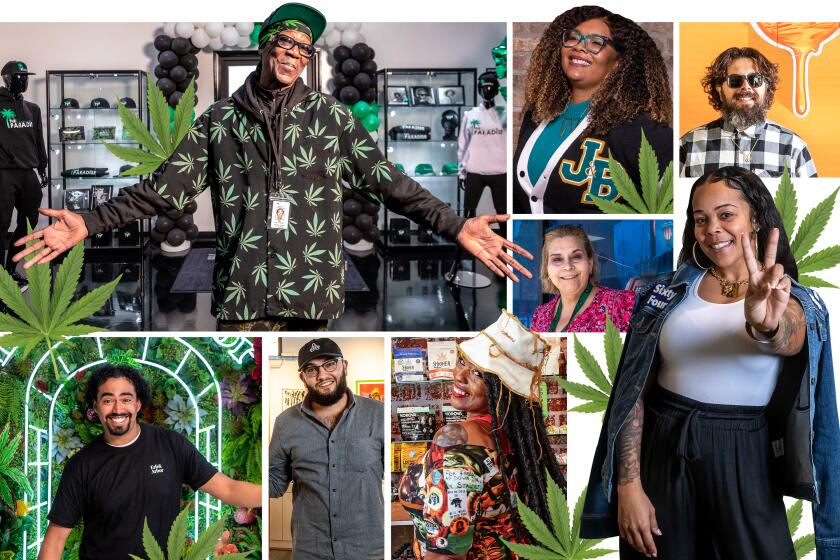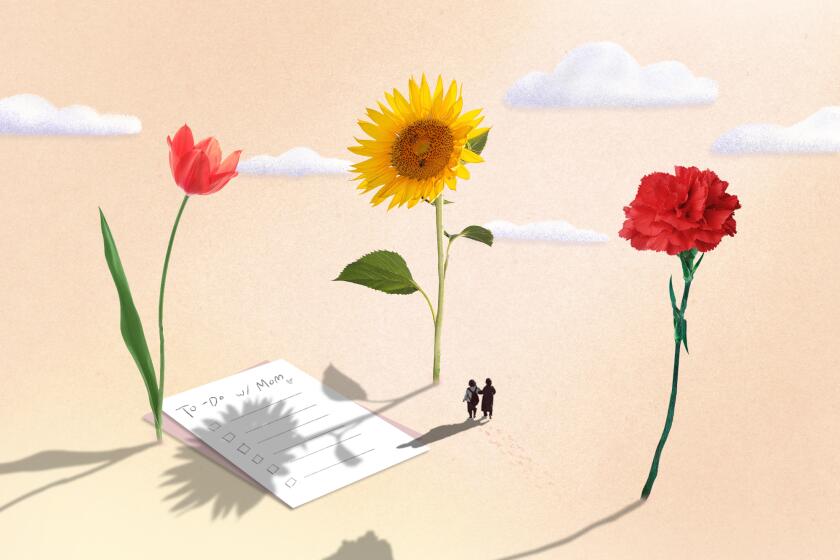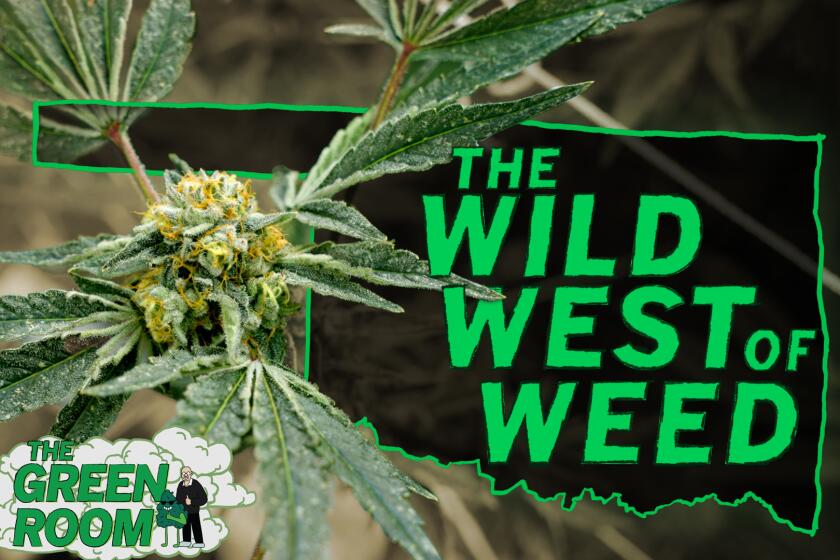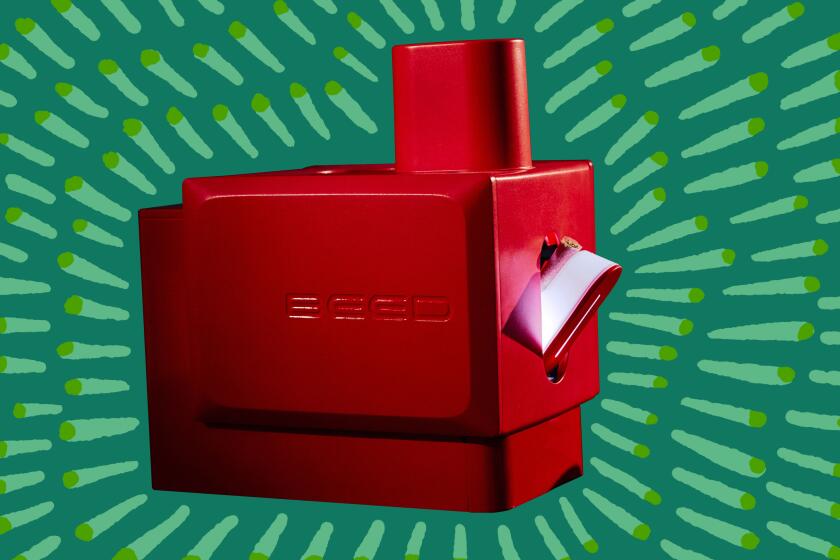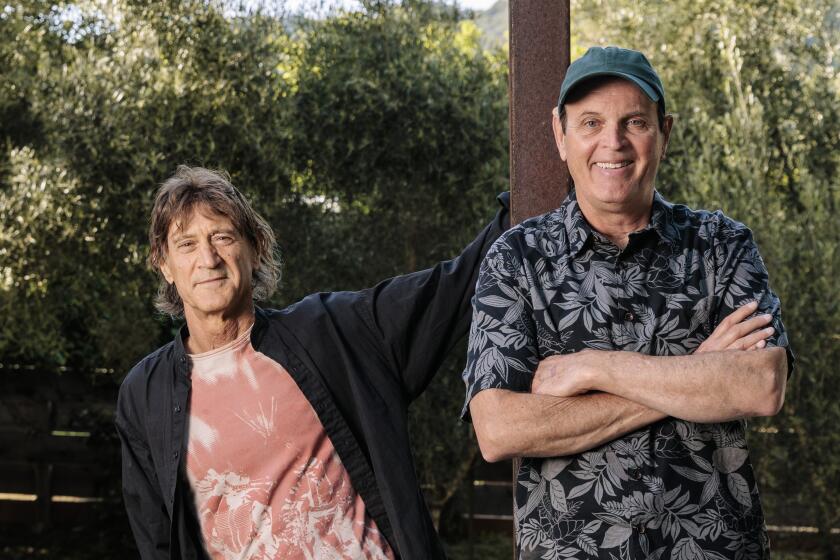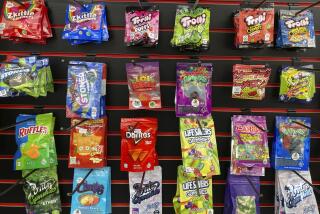‘I’m not doing anything wrong’: Pot-smoking L.A. moms on parenting while high
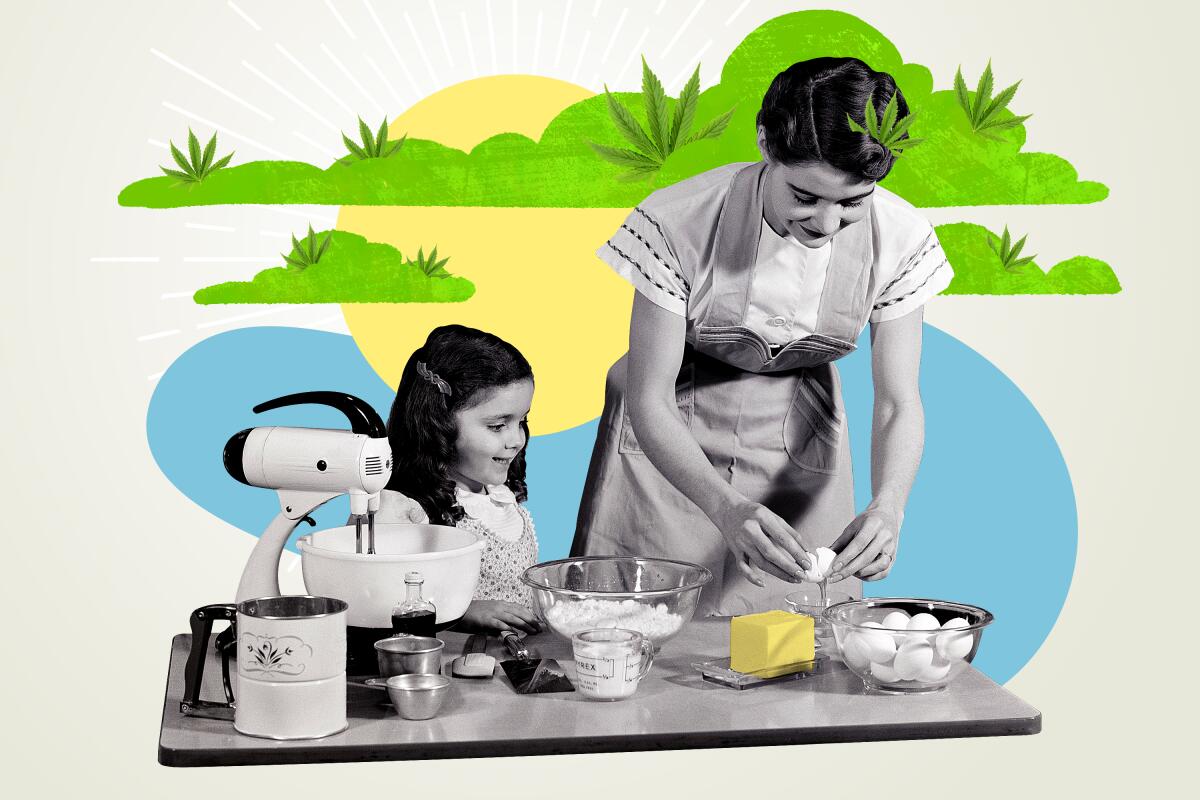
- Share via
From the outside, the moms gathered in a Santa Monica living room could have been conferring about carpools, school boards or fundraisers, any of the myriad mundane meet-ups that come with parenting.
A quick survey of the scene might miss the spindly potted pot plant a few feet away on the deck. It most likely would have skipped right over one mother’s dangly pot-leaf earrings or another’s black T-shirt emblazoned with “Moms who smoke weed aren’t bad moms.” And you’d practically have to be sitting on one of the couches in the compact, art-filled space to notice that the children’s book on the coffee table in front of them was titled “Why Mommy Gets High.”
The living room belongs to the author of that book, Wendy Brazill, and on a sunny April morning she invited fellow local moms Angie Stocker, Shonitria Anthony and Alyssa Wraylie over to talk not about homework or healthful snacks but about marijuana and motherhood. (Brazill has a blended family of six now-adult children with husband, comedy writer/director Chad Einbinder.) Brazill “absolutely” believes consuming cannabis made her better at being a mom.

“I know it did,” Brazill, 57, said of her experiences with being a “cannamom,” a hashtag on social media given to mothers who enjoy marijuana while parenting. “Conversations were deeper. Our playtime was more enjoyable. In my head I wasn’t thinking about the bills I had to pay and things I needed to get done before tomorrow. I was actually able to sit with [my kids], enjoy them.”
For those whose notions of what a mom should be skew more June Cleaver or Clair Huxtable than Lucille Bluth, it might be hard to imagine how puffing pot could be beneficial to the parenting process. However, modern-day mothers have been far more open than past generations about advocating for self-care to address the challenges and stresses of motherhood, and, as cannabis has continued to move mainstream, that conversation includes more moms who find a little weed does what a glass or two of Chardonnay did for their moms by taking the edge off after a long day of raising those little bundles of joy.
Stocker, 39, a West Adams comedian/dispensary receptionist with two children, ages 3 and 6, and an Etsy shop side-hustle selling weed-themed merchandise, is one of those who sings the plant’s praises as mommy’s leafy little helper.
“It’s burnout, it’s stress,” she said. “But it’s also just sometimes you can’t quiet your brain when you’re doing an activity with your kids because you’re like ‘Oh, this is making such a big mess.’ … Cannabis can help you to be like ‘I am in this moment,’ so you’re not thinking about the mess.” (For what it’s worth, Stocker said the right dose of cannabinoids also makes her better at building Lego megastructures. “I can really zone in and be like ‘Boom! Spider-Man’s playhouse!’”)
“This isn’t like when you’re in college and you’re getting stoned and falling asleep on the couch,” added Wraylie, 44, who lives in Topanga Canyon and describes herself as a “mom, herbalist and nurse” with two children, 6 and 9. “This is a very active high. You’re doing all the things of your daily living — and more because you’re doing it for a little being — and then you have to be present and interested in it. And you know, the world is a really stressful place. It always has been, and these days it’s not getting any better.”
Brazill emphasized that “Why Mommy Gets High,” self-published late last year, is an honest-to-goodness kids’ book aimed at kids and not a cheeky children’s-book parody for adults (such is the case with Adam Mansbach’s “Go the F— to Sleep”). And she thinks “Why Mommy Gets High” could be an appropriate part of the pot-and-parenting discussion starting with preschool-age children.
Opening a cannabis dispensary with a social equity license in Los Angeles takes endurance. Here are resilient owners who fought hard to run pot shops.
“I think that it would be a wonderful book for you to read to your kids so that they understand why Mommy’s freaking out,” Brazill said. The book also would help explain why Mommy steps away for a few minutes and then returns saying, “Hey, I feel much better!”
And that it does, in just over a baker’s dozen of pages (illustrated by Daniela Teichmann) that has a young-mommy version of the author cavorting with her children below large-print text. “It’s hard to have fun with so much on my mind / Sometimes Mommy needs a way to unwind,” reads one memorable pair of pages (one of which depicts mother and children tending to a backyard pot plant). You can probably guess what comes next. “Mommy may slip away for just a minute or two / I’ll come back carefree, ready to bake cookies with you.”
Brazill didn’t have “the talk” with her own children until they were in college. (“Their father had become a born-again Christian,” she said. “It just wasn’t something I felt I could speak to them about.”) However, the other cannamoms clustered on her couches said they had already broached the subject with their young ones.
“They know that it’s only for grown-ups, that it’s medicine,” Stocker said. “I think that just being open about it really, really, really helps from a young age so that there’s nothing to hide. I’m not doing anything wrong.”
“It’s the same for me,” said Wraylie. “We’re growing it at home — well, we used to — and it grows at our friends’ houses. These plants are just part of our gardens, [and] our kids know the plants.” Wraylie said she’s taught her children to treat the plant like any of the other plants growing in the family’s Topanga Canyon garden — with one exception. “They know it’s mom’s and dad’s and not theirs.”
This Mother’s Day, give moms the best gift of all: your time. Here are the best things to do on Mother’s Day in Los Angeles that aren’t brunch.
Shonitria Anthony, 33, who lives in West Hollywood and has a podcast and website called “Blunt Blowin’ Mama” (and has little ones ages 3 and 7), said starting early is paramount. “The whole key,” she said, “is to get to them before schools get to them. You want to relay your message first and let them know that you are the authority on this. So they’re not going to be like, ‘But my teacher said, but my counselor said, but my friend said.’ It’s ‘This is what my mom said.’”
“They know what CBD is,” Anthony said. “We have faux cannabis plants in our house — not real ones because I don’t have a green thumb — and it’s a flower to them like any other flower. I try to tell them it’s a cannabis plant. My son is 3 and says ‘ca-na-na-bib-bib-iss.’ He does not understand. My daughter’s like ‘Sure,’ and then it’s back to ‘Paw Patrol.’ So, you know, you give them little bits — you sprinkle a little information — and then you kind of continue to build upon that as they get older and their understanding increases.
“I’m not going to sit there and try to tell my 7-year-old about the war on drugs. … But … saying, ‘This is a plant, not everyone can use this plant. It has healing properties. Mama likes to use this as medicine. It makes me feel better,’ and they understand that.”
From crystals to palm readings, here are the best Mother’s Day gifts for Los Angeles moms who love astrology.
Although that might seem like a particularly young age to kick off the conversation about drugs, it’s not out of line with the approach espoused by the Substance Abuse and Mental Health Services Administration, a Rockville, Md.-based agency within the U.S. Department of Health and Human Services. “It is never too early to talk to your children about alcohol and other drugs,” reads an excerpt from the section of SAMHSA’s website titled Why You Should Talk With Your Child About Alcohol and Other Drugs. “Children as young as nine years old already start viewing alcohol in a more positive way, and approximately 3,300 kids as young as 12 try marijuana each day.”
Julie Schauer, director and co-founder of Merrifield, Va.,-based nonprofit Parents Opposed to Pot, agrees that parents have a responsibility to have serious conversations with their children about drugs but thinks it should be just a little bit later. “I think it should be young,” she said. “I would put it at third to fourth grade. ... I’ve been around 3-year-olds, and you can say to a 3-year old ‘That pill is not for you,’ but they’re not really going to understand why.”
As to whether pot-partaking parents should be open with their children about their current (as opposed to past “mistakes were made”) use, Schauer said she “really didn’t have an opinion.”
“To me what is more bothersome is that they use [cannabis] when they’re raising kids,” she said. “That’s the big judgment. I do think you should be honest with your kids.”
As for Brazill’s children’s book, Schauer said, “I don’t see the point of writing this book other than to normalize cannabis use and promote it. I honestly don’t see it. Have there been books written by parents about how do I discuss my pain-pill use? How do I discuss my drinking? Maybe there have been, and I haven’t seen them.”
Low start-up costs, less regulation and a central location have local cannabis brands looking east.
And the argument that cannabis consumption lowers stress and therefore raises the quality of parenting? “I can understand that viewpoint a little bit,” Schauer said. “I can see if you have a toddler running here and there, [cannabis] could make them less stressed, but I’d suggest they find other ways to make themselves less stressed like do yoga or other outside things.”
The problem with continued pot use, in her opinion, is that “the lack of concern or worry could reach proportions of clinical apathy ... extreme apathy in parenting. And that could be very dangerous to the child.”
The cannamoms conferring on Brazill’s couch say they’re well aware of the challenges and dangers of parenting under the influence of anything and say they make it a point to have what Wraylie calls “seat belts” on hand. In other words, they have safety precautions that include planning ahead, the presence of other caregivers and having CBD products on hand. (Consuming CBD is a popular way to try to counteract an extreme THC high. Although a scientific study recently called that into question, Anthony said it has helped her when she has overindulged.)
The pricey pod-based Beed from an L.A. startup is the joint-rolling party trick that post-pandemic folks deserve.
By way of example, Anthony described a recent encounter with a new strain. “I smoked it and I was so high, I was like ‘Oh. My. God!’” she said. “And my partner was home — I never do this without my partner being home — and I told him, ‘You’re going to need to go make the kids’ snacks. I’m going to go lay down. ... As a parent, there’s nothing worse than that feeling of not being in control. It’s just not a good feeling, and a good parent wants to be prepared and have that seat belt, as they say.”
The cannamom contingent says pot-parenting stigma and double standards are alive and well — even where cannabis is legal.
Where does 420 come from? The Waldos, a group of friends who met at San Rafael High School, say they started the 420 movement back in 1971.
“In California you can get a little bit of judgment. … It’s a bit normalized,” said Anthony. “On the East Coast? Absolutely not. That’s something you keep between yourself and your partner or your co-parent … because you do risk Child Protective Services [or the] Department of Children and Family Services intervening. And that is not something that you want.”
Stocker remembers heading off to pick up her children from preschool wearing a “Weed is my lifehack” T-shirt. “Even with my husband — who consumes [cannabis] and is totally great — was like ‘You’re just going to wear that to the preschool?’” she said. “And I was like ‘You’re wearing a shirt from a brewery!’ … It’s not necessarily something that’s in the front of people’s minds, but it’s just this little voice that people have like ‘Is she wearing weed leaves right now?’”
The Green Room
Episodes of the second season of The Times’ video series focusing on California’s cannabis commerce and culture drop every other Wednesday at youtube.com/c/latimes.
The Mother’s Day episode of “The Green Room,” featuring highlights of the #cannamom roundtable hosted by “Why Mommy Gets High” author Wendy Brazill, can be found above.
Speaking of husbands, many of the cannamoms have experienced what they feel is a glaring double standard in the pot-smoking-parent dynamic. “‘Cannamom’ is a thing on the internet: #cannamom is a total phrase,’ said Anthony. “I don’t hear ‘#cannadad.’ And it’s like, do we not care about dads [consuming cannabis] because dads don’t actually carry the child? [Because] they don’t nurse the baby? I think there’s more concern about that direct connection.”
Stocker followed on that point by noting that, in most of the parent dynamics she’s encountered, the dad seems to be the couple’s designated cannabis consumer, and the mom is not. “If you’re a mom, it’s like ‘You are a mother,’” she said. “It is your whole life, your whole personality. … You don’t get to have anything outside of that.”
More to Read
Sign up for The Wild
We’ll help you find the best places to hike, bike and run, as well as the perfect silent spots for meditation and yoga.
You may occasionally receive promotional content from the Los Angeles Times.

